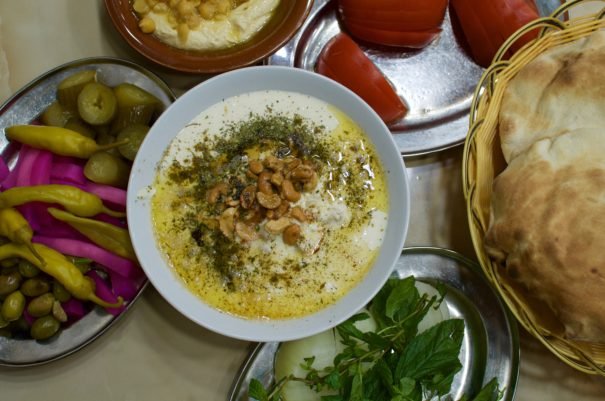
The Levantine Answer to Chilaquiles

The Levantine Answer to Chilaquiles
Fatteh in Beirut
Abu Hassan’s—a bustling restaurant turning out no-nonsense Levantine classics on one of the main avenues running through Bourj Hammoud, Beirut’s Armenian quarter—is open 24/7.
On this particular Saturday, the tables in the dining room are laden with plates of foul, msabaha and spiced eggplant, pitchers of water, and baskets of hot flatbread. Later on, perhaps, hungover revelers—exhausted from a night out in Beirut’s legendary clubs, or the bars packing neighborhoods just west of here—will arrive seeking fried eggs and a miracle, but for now the tables are filled with groups of men speaking softly, rhythmically tearing off strips of khubz to scoop up hummus and labneh.
On the day I arrived in Beirut, my Lebanese host insisted I try Abu Hassan’s fatteh—a dish I had never heard of. Months after that initial recommendation, on the day I’m scheduled to leave Beirut, I finally make it to this table, hungry from a brisk run in the Horsh (the city’s only sizeable park, which straddles the “green line,” the civil war-era no-man’s land between Christian East and Muslim West) in the crisp, clear weather following the first storm of the winter.
Waiters rush around carrying platters of fresh mint, quartered onions, sliced tomatoes, and assorted pickles. Water is poured into plastic cups. The menu—a small laminated card—offers a dozen or so dishes, five of which are variations on the fatteh theme. Derived from the Arabic “fettfet” (to make crumbs or to break into pieces), fatteh is always built on a base of torn and toasted flatbread, studded with boiled chickpeas. Over this foundation, a sauce, with ingredients that vary from kitchen to kitchen, is poured—softening the bread and chickpeas into a velvety mush. At Abu Hassan’s, that sauce might be based on tahini or yoghurt or olive oil. We opt for the house style, Fatteh Abu Hassan, that makes use of all three.
The dish arrives in a deep bowl, like a pale soup crowned with roasted cashews. Green-gold glugs of olive oil are set against the creamy yoghurt, off-white with tahini and flecked with herbs. An exploratory plastic spoon sinks effortlessly into the mix, through the tender layers of bread. The mellow tang of garlic and clarity of lemon offset the unctuous sauce, while the cashews’ crunch enlivens the spongy bread and nutty, tender chickpeas.
Here are the staple flavors of the region, yes, but transformed into a breakfast of champions, the ultimate comfort food—a Levantine version of poutine or chilaquiles.
Our fried eggs and hummus are all but set aside as we spoon up warm, viscous dollops of fatteh, shoveling it into flatbread pockets or eating it as is. Around us, the dining room hums with quiet satisfaction. Lunch will not be necessary.